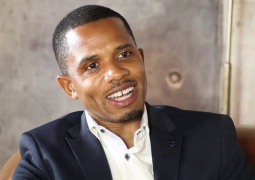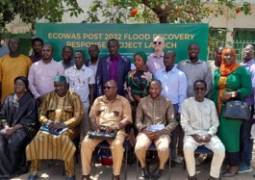The event held at the Sir Dawda Kairaba Jawara Conference Centre was organised by the Hamburg University of Applied Sciences in Germany, and the University of The Gambia (UTG) in collaboration with the West African Science Service Centre on Climate Change and Adapted Land Use (WASCAL) among others.
The event was to discuss the means via which African universities can support the resilience capacity of African countries, and showcase experiences from research, field projects and best practice in climate change adaptation in African universities.
Professor Pierre Gomez, Minister of Higher Education, stated that climate change is a very challenging phenomenon throughout the world but more so in least developing countries like The Gambia that have low capacity in terms of funding, research and implementation of climate adaptation.
"It is widely known that Africa is one of the most vulnerable countries to climate change impact. As reported in the sixth assessment report of the intergovernmental panel on climate change, climate change is expected to have a wide impact on African societies and African interaction with the natural environment,” the minister said.
He explained that there are also signs that the impacts of climate change are already being felt across all sectors including education. He urged the Federal Ministry of Education and Research (BMBF) to consider and provide more funding in order for team Gambia and team Germany to carry out more research in climate change adaptation so that most vulnerable communities could adequately adapt to the impact of climate change to increase their resilience.
Prof Herbert Robinson, Vice Chancellor of UTG, also highlighted that climate change is very destructive and that its impacts are visible in the environments such as drought, food insecurity, damage to human health, and damage to infrastructure and the livelihood of human kind.
These impacts, he said, are devastating with proportionate impacts on communities in Africa, adding that scientific reports indicate that if the world doesn't take immediate action and increase global temperature by 2°c, it could cause damage to Africa's ecosystem and livelihood.
“Tackling the challenges of climate change in the area of adaptation to research is therefore critical and timely for the future of Africa. The strong and fruitful working relationship between UTG and Hamburg University of Applied Sciences WASCAL is a reflection of the need to build stronger partnerships to tackle climate change,” he said. “There is no doubt that such partnerships are essential to enhance our capacities to deal with the challenges of climate change in order to build the resilience of our citizens and communities.”
Prof Robinson further stated that strengthening the research infrastructure and capacities of our young and upcoming climate scientists is a top priority in West Africa, saying it can be done in several ways by pulling the expertise of climate scientists in West Africa and other parts of the world to create a network of climate scientists for knowledge exchange.
“This can be done by showcasing successful examples of best practices on how to cope with social economic and political problems posted by climate change in Africa; and by providing regular platforms such as this international symposium for debate, dissuasion, and update and groundbreaking research,” he says. “There is a need for evidence-based research to ensure a better understanding of how climate change can affect African countries and for the identification of processes, and methods which will help African countries to better adapt to this impact.”
Prof Walter Leal, chairperson of Hamburg University of Applied Sciences in Germany, described Africa as the continent of the future, saying it has many environmental and human resources.
He also thanked The Gambia for the wonderful work on climate change projects.





